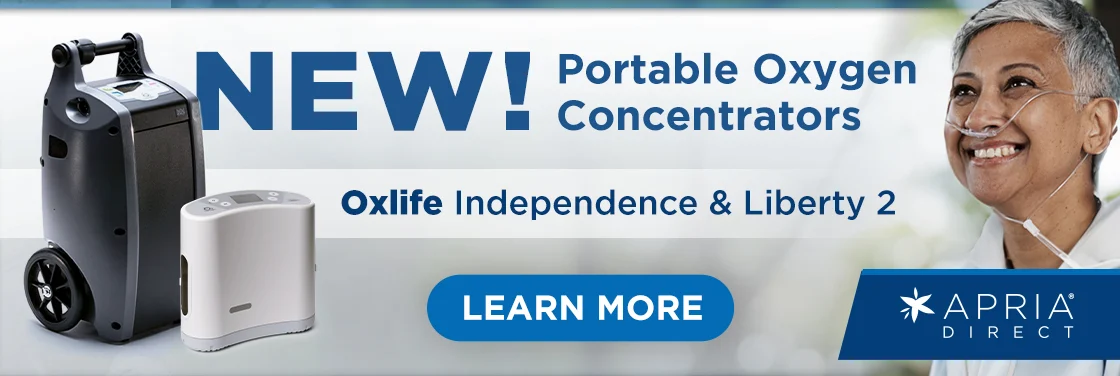Consider These Safety Precautions Before Leaving The House During Cold Weather If You're On Oxygen Therapy
For people with COPD (chronic obstructive pulmonary disease) and other chronic respiratory conditions, colder months can raise concerns. Restricted blood vessels, reduced oxygen levels, and blood flow are all significant factors to consider. Although many challenges come with normal day-to-day activities, don't let it deter you.
Lesley Williams, Registered Respiratory Therapist at Apria with 35 years of experience, states, "Extreme cold poses additional risks for individuals with chronic lung diseases, making preparation crucial for their well-being. Whether securing extra inhaler supplies or having backup power sources like generators for essential medical equipment such as ventilators, CPAP machines, or oxygen concentrators, proactive measures are essential to mitigate potential risks during emergencies."
Before Leaving the House
Portable Oxygen Concentrators
There is a lot to consider when on oxygen therapy and preparing to leave the house. If you use a portable oxygen concentrator (POC), ensure your machine will work properly in lower temperatures by checking with the manufacturer. Most POCs are not designed to operate below 40 degrees Fahrenheit; try to limit the machine's exposure time in the cold. Warm up your machine before turning it on to ensure proper operation.
Portable Tanks
Cold air is harsh and dry compared to the warmer air we feel in summer. When your body inhales cold air, it is trying to humidify it, causing shortness of breath and irritation. This is especially true for those who have a respiratory condition. For those using portable tanks, it is essential to limit your tank’s exposure to extremely cold temperatures to avoid breathing in cold air that can irritate the airway and lungs.
How You Can Prepare for Colder Temperatures
Take these precautions when the cold weather hits:
- To prevent irritation, practice breathing techniques and encourage strong airflow. Breathe in through your nose and out through your mouth; this way, the air you breathe will be warm once it reaches the lower airway.
- An accessory covering your nose and mouth allows warm air to be inhaled. Be sure to use a fabric without loose fibers to prevent breathing them in.
- Humidifiers are meant to add humidity or moisture into the air to prevent dryness and irritation to the body. Using a humidifier in your home allows you to breathe easily, knowing that the winter temperatures and your home's heat aren't contributing to difficulty breathing.
- Dry airways are common for everyone during the winter months. Using candles, scented sprays, and strong odors can irritate your airway more. Consider avoiding these when possible.
- The relaxing feeling of sitting by the fireplace as the snow falls is tempting, but wood-burning fireplaces can irritate your airway and encourage symptoms. The mixture of smoke and chemical particles from items like fire starters makes breathing especially dangerous.
- The challenging weather in the winter can bring anxiety and stress to those with respiratory disease when thinking about leaving the house. Consider staying inside when you can.
Use our tips above to ensure your home is a safe place to live and breathe healthy
Taking proactive steps to manage oxygen therapy during the colder months is crucial for maintaining respiratory health. By following these tips, individuals with respiratory diseases can navigate winter with greater ease and reduce the risk of exacerbating symptoms. Always consult with healthcare professionals for personalized advice tailored to your specific condition. Stay warm and breathe easy!
References
“Benefits of Using a Humidifier in Winter 2024.” Health and Care, January 4, 2024. https://www.healthandcare.co.uk/blog/the-benefits-of-using-a-humidifier-in-winter.html.
“Cold Weather and Medical Equipment.” Precision Medical. Accessed January 23, 2024. https://precisionmedical.com/cold-weather-and-medical-equipment/.
“The Complete Guide to Managing Your COPD in the Winter.” LPT Medical, April 25, 2022. https://lptmedical.com/blogs/respiratory-resource-center/the-complete-guide-to-managing-your-copd-in-the-winter#:~:text=If%20the%20air%20in%20your,tubing%20from%20the%20cold%20air.
Editorial Staff. “Tips for Outdoor Exercise in Cold Temperatures.” American Lung Association, February 8, 2018. https://www.lung.org/blog/outdoor-exercise-winter#:~:text=Remember%20to%20breathe%20through%20the,activities%2C%20as%20regularly%20as%20possible.
Shiari, Aryan. “Cold Weather and Your Lungs.” Mayo Clinic Health System, January 27, 2023. https://www.mayoclinichealthsystem.org/hometown-health/speaking-of-health/is-the-extreme-cold-bad-for-your-lungs#:~:text=Cold%20air%20is%20generally%20drier,feeling%20of%20shortness%20of%20breath.
Vasta, Chris. “How to Use an Oxygen Concentrator in Severe Weather.” Oxygen Concentrator Supplies, December 21, 2023. https://www.oxygenconcentratorsupplies.com/articles/how-to-use-an-oxygen-concentrator-during-winter#:~:text=Most%20oxygen%20concentrators%20do%20not,to%20the%20cold%20too%20long.
LEGAL DISCLAIMER: Material in this newsletter is provided for general health education and informational purposes and to provide references to other resources only; it may not apply to you as an individual. While Apria Healthcare believes that the information provided through this communication is accurate and reliable, Apria Healthcare cannot and does not make any such guarantee. It is not intended to be a replacement for professional medical advice, evaluation, diagnosis, services or treatment (collectively, “medical treatment”). Please see your healthcare provider for medical treatment related to you and your specific health condition(s). Never disregard medical advice or delay seeking medical care because of something you have read on or accessed through this website. Reading this newsletter should not be construed to mean that you have a healthcare provider/patient relationship.






